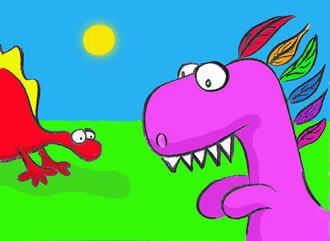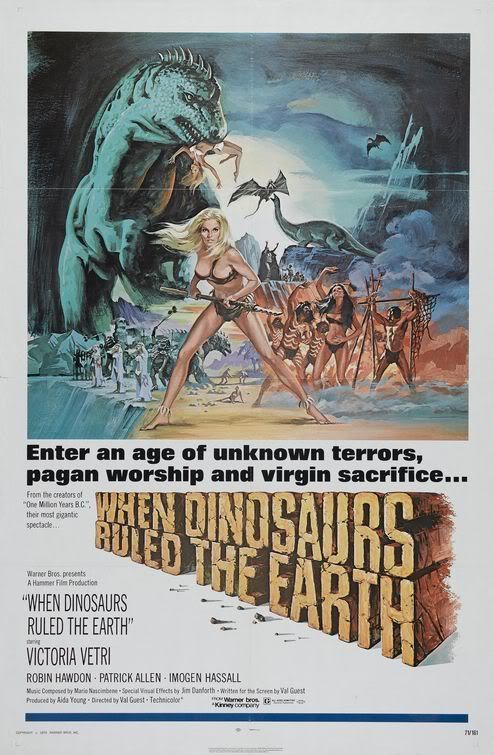When Dinosaurs Ruled the Earth
Technorati tags: Humor, Metaphor, Malaysia, Dinosaurs, Time, Illusion
"Time is an illusion, and lunchtime doubly so"
(Ford Prefect - "The Hitchhiker's Guide to the Galaxy" by Douglas Adams)
 Zillions of years ago, scientists say that dinosaurs used to roam the Earth. And quite happily too, rumor has it. They would frolic in the friendly weather, going about on their dinosaur business.
Zillions of years ago, scientists say that dinosaurs used to roam the Earth. And quite happily too, rumor has it. They would frolic in the friendly weather, going about on their dinosaur business.
Some were veggie-saurs, grazing on the grasslands, or eating shrubs and other vegetation abundant in those times. Others were meat eaters, hunting down other dinosaurs. Life was in a rather nice balance.
And one key factor sustaining these lumbering giants was what Walski calls "Natural Environmental Protection" - agreeable climate, not too hot, and not too cold. Kinda like the just right temperature porridge that got Goldilocks into a bind with the three bears. But that's another story.
Then one fine day, Mother Nature decided to revoke the Natural Environmental Protection that sustained the dinosaurs all those merry years. In fact, arguably, it not only sustained but defined the dinosaurs' existence. Scientists say it was some cataclysmic event or other. Some people say it was aliens. Others say it was brought about by global warming, caused by increased amounts of methane introduced into the atmosphere from dino flatulence.
Whatever it was, almost overnight, the Natural Environmental Protection that the dinosaurs enjoyed was no longer there. The global climate changed drastically, culminating in what we now know as the Ice Age.
Now, having enjoyed Natural Environmental Protection for far too long, the dinosaurs simply took the good life for granted. If they had been more mindful, they would have taken precautions against the effects of the impending Ice Age. Like, for instance, making sure their diet was more balanced (hence, less flatulence), or perhaps learning to dress more appropriately for the cold. The dinosaurs honestly thought the Natural Environmental Protection they enjoyed would be perpetual.
In any case, without the Natural Environmental Protection, and with, of course, the Ice Age, most of the dinosaurs just perished. Some eventually evolved into other climate-appropriate beasts. But most of the dinosaurs simply didn't survive.
(if by now you're going "WTF?", all is explained, in the full post)
Fast-forward a zillion years later... to today. Thursday.
Are some of us destined to be like the dinosaurs of so many millions of years ago, soon to perish with another impending Ice Age, brought about by the over-reliance on another kind of Natural Environmental Protection?
Or are we willing to evolve into another kind of beast, more flexible and resiliant to environmental changes? And in the process learn to not produce so much hot air.
History, it seems, has a bad habit of repeating itself. And once again, it's the dinosaurs that take things for granted that are the ones most at risk. The smarter ones will simply choose to evolve.
And survive.
 The title of this post is taken from the 1970 film of the same name. It stars a whole bunch of unknowns. And most of these unknowns didn't exactly become household names afterwards either.
The title of this post is taken from the 1970 film of the same name. It stars a whole bunch of unknowns. And most of these unknowns didn't exactly become household names afterwards either.
It is a follow up to the 1966 film "One Million Years BC" (starring a very young Raquel Welch). But apart from the excellent dinosaur sequences, "When Dinosaurs Ruled The Earth" was a lame-ass bad film from all other perspectives.
And while the Hitchhiker's Guide to the Galaxy has nothing whatsoever to do with dinosaurs, the book does contain some excellent quotes pertaining to Thursdays, time, life, the universe, and everything in between.
Had the dinosaurs read the series of excellent books by Douglas Adams, Walski has no doubt in his mind that there would probably be a whole load of 'em dinosaurs roaming the Earth today.
And apart from not coping with the weather, another factor leading to the demise of the dinosaurs was that they didn't develop a good reading habit. Instead, they substituted reading with watching film, or made-for-TV adaptations.
You tend to lose a lot in the translation.
















